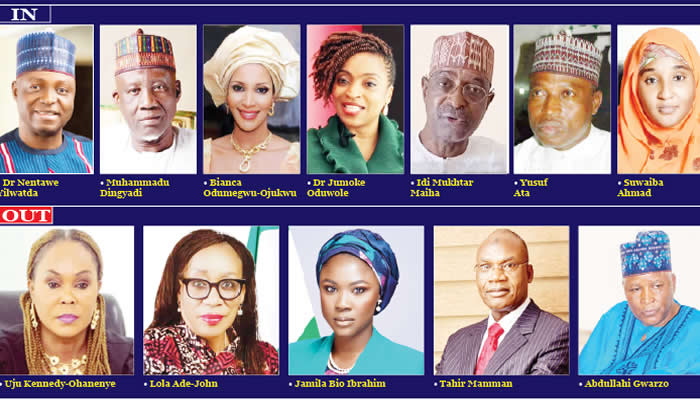...To get all news updates, Join our WhatsApp Group (Click Here)
Also Join our WhatsApp Channel (Click Here)
Months after the rumours of imminent cabinet reshuffle had filled the air with newshounds speculating which of the ministers would be dropped or retained, President Bola Tinubu eventually took the bull by the horns last Wednesday.
He effected the ministerial changes, scrapping two ministries, discharging five ministers, reassigning ten and nominating seven new ones. It would mean six ministers had given way if you add the initially suspended Minister of Humanitarian Affairs and Poverty Reduction, Dr Betta Edu. A new minister, Dr Nentawe Yilwatda, has been nominated to replace her.
It was the first cabinet reshuffle by President Tinubu 17 months after he assumed office. The way and manner he effected the changes were interesting.
After Wednesday’s Federal Executive Council meeting, the President invited five of the 47 ministers to see him in his office. An ominous silence descended on the hallowed Council Chambers, the venue of the FEC meeting. Many in the chambers feared these five ministers were on their way out, that the sun had set on their tenures, and that the President was inviting them to convey the grim decision, a valedictory visit.
The five ministers that were relieved of their ministerial roles following a scientific assessment of their performance in an exercise coordinated by Special Adviser to the President on Policy & Coordination Hadiza Bala Usman were those of Education-Prof. Tahir Mamman, Women Affairs- Mrs. Uju Kennedy Ohanenye, Tourism- Mrs. Lola Ade-John, Housing Development (State), Abdullahi Gwarzo and Youth Minister, Jamila Ibrahim Bio.
Inherent in the cabinet reshuffle was a restructuring to reinvigorate government machinery for optimal efficiency, consistent with the spirit of the much talked about Oronsaye Report. This is evident enough. President Tinubu scrapped the Ministry of Tourism, merging it with the Ministry of Arts and Creative Economy to form the Ministry of Arts, Culture, Tourism and Creative Economy. He also abolished the Ministry of Niger-Delta Development and, in its place, created the Ministry of Regional Development to oversee the various regional development commissions in the country, including the Niger-Delta Development Commission and North-East Development Commission as well as the North-West Development Commission and South-East Development Commission recently established by the Tinubu administration.
Creating separate ministries for each region like the case of Niger-Delta in the earlier dispensation would have been an unnecessary duplication and addition to the governance cost.
As part of the restructuring, the President also ensured that there are no longer two ministers in the ministries of Police Affairs and Youth Development, thus further reducing overheads.
Beyond that, there are a few takeaways from the cabinet rejig and the new ministerial list.
One, the appointment of Bianca Odumegwu Ojukwu, wife of late Ikemba of Nnewi, Odumegwu Ojukwu, as a minister is noteworthy. Lawyer and diplomat, bringing on board Bianca as Minister of State for Foreign Affairs is a round peg in a round hole, given her experience as Nigeria’s Ambassador to Ghana and later Spain. Tapping Bianca for appointment from the opposition All Progressives Grand Alliance is a mark of political tolerance by President Tinubu. Also, coming on the heels of establishing the South-East Development Commission, this appointment is a good development for the South East. Many political watchers and pundits expect the region to reciprocate the gesture in the 2027 election.
Two, in agriculture, the establishment of the Ministry of Livestock Development is novel and a problem-solver. Animal husbandry is part of the issue at the root of the incessant farmers-herders crisis, which involves sourcing food and water for cattle. This ministry is charged with managing the livestock economy and, by inference, addressing this seemingly intractable farmers-herders problem. And if this new ministry helped to resolve the crisis, the whole issue of insecurity on our farms and its attendant effects on food supply and security would have been resolved. Perhaps to demonstrate the government’s commitment to the livestock sector reforms, a workshop on the reforms was organised a day after the new cabinet composition, during which President Tinubu told all and sundry that the livestock economy is central to his administration’s vision.
Third, President Tinubu has set a record by affixing portfolios to the names of nominees sent to the Senate for confirmation as ministers. This makes sense because senators can now match the portfolios with the nominees’ academic backgrounds and professional experiences during confirmation hearings. This is a first in the country, and President Tinubu deserves commendation for this.
The fourth and final point concerns the expectation of some commentators who argued that the changes were not far-reaching enough. They said they expected a tinkering of the critical sectors of the economy, particularly oil and gas and finance. However, President Tinubu has done what is needed. There is now a Minister of State, Dr Doris Uzoka-Anite, to complement the Minister of Finance and Coordinating Minister of the Economy, Olawale Edun. As former top management staff at Zenith Bank and later Commissioner for Finance in Governor Hope Uzodimma’s Imo State, Dr. Uzoka-Anite is equally grounded in finance and economic matters.
As it were, pressing issues in the critical economic sectors are being addressed. The policy changes introduced by the government have begun to produce positive results. This is evident in the available data. Nigeria’s revenue to debt service ratio has declined significantly, from 97% in 2023 to 68% in 2024, according to the Minister of Finance and Coordinating Minister of the Economy. The country’s foreign reserves are also on the increase. Edun says the reserves are growing organically due to the government’s decision not to defend the Naira as was done in the past. Additionally, the country’s GDP grew by 2.98% in Q1 2024 compared to 2.31% in Q1 2023. The growth in Q1 2024 was due to the impressive performance in the financial services, insurance, mining and quarrying sectors.
Indeed, as the Americans would say, if it’s not broken, why fix it? The Tinubu administration is committed to the reforms and is implementing them faithfully. The reforms had become imperative in order to ensure sustainable growth. That the gains have yet to manifest fully is neither because the officials involved are unqualified, incapable, or unwilling to do the right thing. It’s because these reforms have gestation periods. They will fully manifest in the fullness of time, and the country will be better and more prosperous.
Rahman is a Senior Special Assistant to the President on Media Matters.
You can get every of our news as soon as they drop on WhatsApp ...To get all news updates, Join our WhatsApp Group (Click Here)
Also Join our WhatsApp Channel (Click Here)

















